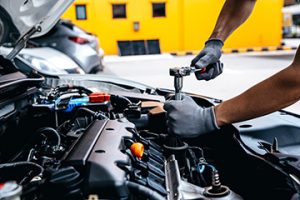Knock Sensor: How It Works and Why It Matters at Meineke in Williamsburg
When your engine runs smoothly, your knock sensor is quietly working behind the scenes to prevent costly damage. Since it detects engine vibrations caused by abnormal combustion—commonly called knocking or pinging—this small but vital sensor plays a big role in engine health. Whether you’re commuting through Williamsburg for the local athletics or cruising on the highway, a working knock sensor helps keep your engine running efficiently.
At Meineke in Williamsburg, we understand that hidden engine problems can lead to expensive repairs. So, in this post, we’ll explain how the knock sensor works, why it’s important, how to maintain it, and when to visit a mechanic for expert service.
How the Knock Sensor Works
To start, the knock sensor constantly monitors engine vibrations and sends real-time data to the engine control module (ECM). When it detects knocking—a condition caused by fuel igniting too early—it signals the ECM to adjust the ignition timing. As a result, your engine avoids internal damage and continues running smoothly.
Because today’s engines rely on precise fuel control and timing, the knock sensor plays a crucial role in keeping all systems balanced under the hood.
Why the Knock Sensor Is Important
Even though the knock sensor is small, it performs a huge job in protecting your engine from damage. Since engine knocking can destroy internal components over time, early detection is critical.
-
First, it prevents damage caused by detonation or pre-ignition.
-
Next, it helps improve performance by allowing more accurate timing adjustments.
-
Also, it boosts fuel efficiency by ensuring proper combustion.
-
Additionally, it reduces harmful emissions by managing engine operation.
-
Finally, it helps your car run more smoothly without knocking, hesitation, or misfires.
How to Maintain Your Knock Sensor
Although knock sensors are built to last, they can fail due to heat, vibration, or long-term wear. So, here are some maintenance tips to keep yours in top shape:
-
Schedule routine engine diagnostics at Meineke in Williamsburg to ensure your sensor is performing properly.
-
Use high-quality fuel because poor-quality gasoline can cause more frequent engine knock.
-
Avoid aggressive driving, especially when towing or carrying heavy loads.
-
Keep your engine tuned by replacing spark plugs and ignition parts on schedule.
-
Address check engine lights immediately, since they could be signs of knock sensor issues.
When to See a Mechanic at Meineke in Williamsburg
Sometimes, a failing knock sensor won’t cause obvious symptoms right away. So, it’s important to visit Meineke in Williamsburg if:
-
Your check engine light turns on, especially with knock sensor-related codes
-
You hear pinging, tapping, or knocking noises during acceleration
-
Your car loses power or shows reduced fuel efficiency
-
The engine feels sluggish, hesitant, or unresponsive
-
Your vehicle is high-mileage and the knock sensor has never been inspected

So, Call Meineke in Williamsburg Today for Knock Sensor Diagnostics and Repair
Because your knock sensor protects your engine’s performance and longevity, you shouldn’t ignore the warning signs. At Meineke in Williamsburg, our ASE-certified technicians use advanced tools to detect sensor problems and restore your engine’s power. Whether you need a quick replacement or a full performance check, we’ve got you covered.
So, call Meineke today and protect your engine from costly damage—because peace of mind starts under the hood.
If the Meineke in Williamsburg is not convenient, also check out these other locally-owned Meineke locations in Virginia:
- Meineke Virginia Beach #197
6399 Indian River Road
Virginia Beach, VA 23464-3500
Call (844) 768-6004 - Meineke Virginia Beach #312
1837 Laskin Road
Virginia Beach, VA 23454-4504
Call (833) 696-8494 - Meineke Virginia Beach #2739
1321 Diamond Springs Road
Virginia Beach, VA 23455
Call (757) 687-0566 - Meineke Virginia Beach #2883
3700 Holland Rd
Virginia Beach, VA 23452
Call (757) 932-2952 - Meineke Charlottesville #342
1906 Emmet Street
Charlottesville, VA 22901-2815
Call (855) 747-2083 - Meineke Hampton #584
79 West Mercury Boulevard
Hampton, VA 23669-2508
Call (757) 690-7689 - Meineke Yorktown #851
4609 George Washington Memorial Highway
Yorktown, VA 23692-2766
Call (757) 847-9155 - Meineke Williamsburg #938
399 Second Street
Williamsburg, VA 23185
Call (757) 585-4492 - Meineke Denbigh #1088
415 Oriana Road
Newport News, VA 23608
Call (757) 814-2724 - Meineke Richmond #2514
5271 S Laburnum Avenue
Richmond, VA 23231
Call (804) 222-2862
